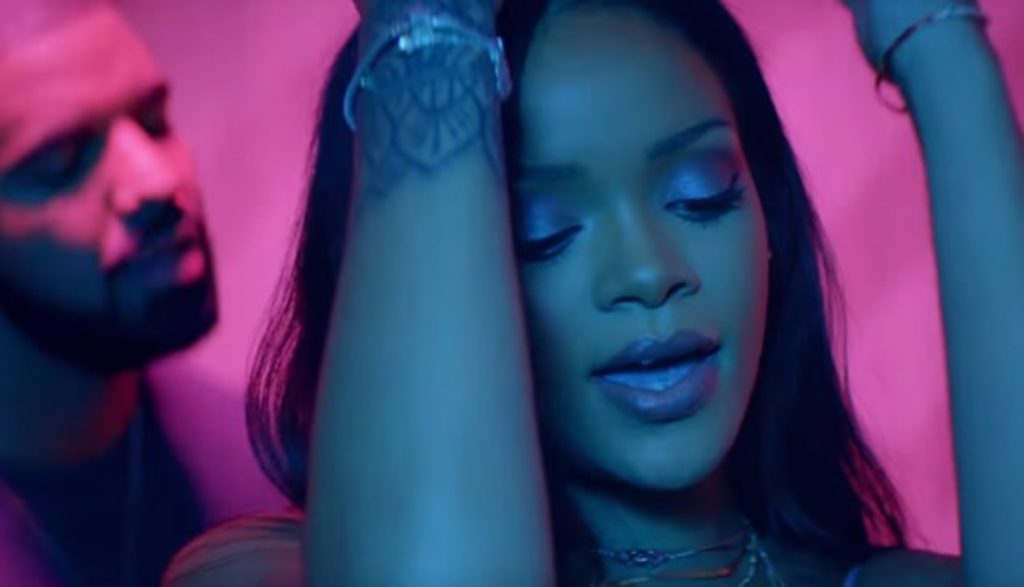
Listening literally and concretely to “Work,” you hear a song that sounds like a complaint about a man who forces his lover to work too much. “Work, work, work, work, work, work,” she complains. “He said me haffi/Work, work, work, work, work, work.”
But what if the titular word is actually a stand-in for something else?
There is a complaint on “Work.” And the nature of it becomes quite clear when we realize the word work in Jamaican Patois (a lingo Rihanna grew up with) is also slang for sex. As for “haffi,” that’s shorthand for “have to.”
With that decoder ring in hand, the song begins to make sad sense: “Sex, sex, sex, sex, sex, sex/He said I have to have/Sex, sex, sex, sex, sex, sex.”
And while Rihanna has been more than happy to use sex to sell records (and attract video viewers, which I’ll get to momentarily) in the past, this time around she seems to be playing the part of a woman who doesn’t much care for the sexual subjugation she feels compelled to submit to.
The first verse after the chorus (which launches the song) narrates the story of a woman who longs for a deeper connection with her man, but all he’s interested in is … work.
“Me a desert him!” she declares, followed by a tale of being seduced by his slick promises (“I believed all of your dreams, adoration/You took my heart on my sleeve for decoration/ … All that I wanted from you was to give me/Something that I never had”).
Still, she stays with the guy, even though he’s only interested in taking advantage of what her body has to offer him. We don’t know why, for sure, but the second verse perhaps implies that she’s economically vulnerable and thus desperate for her man to stick around. “Beg you something please,” she cries, “Baby, don’t you leave/Don’t leave me stuck here in the streets.” Then she promises, “If I get, get another chance to/I will never, no never neglect you/I mean, who am I to hold your past against you?”
That last plea is especially haunting given the abuse that Rihanna infamously suffered at the hands of her then-boyfriend Chris Brown back in 2009. Her man this time around, played by Drake on the song and in the video (and perhaps in real life these days, too, if tabloid reports are accurate) seems pretty chill about her desperation. “Yeah, OK/You need to get done, done, done, done at work, come over/We just need to slow the motion.” Then he adds, with faux magnanimity (that’s belied elsewhere), “I don’t want to rush into it if it’s too soon.” In the end, though, he just keeps pushing her to go to work (“Now you need to forward and give me all the/Work, work, work, work, work, work”).
Given all of that, there are a couple of ways to think about this song. First, if you don’t know what work really means, it just sounds like someone who’s frustrated with a man who makes her labor and toil too much. But for those who do know the song’s “other” interpretation, we’ve got an even darker story to grapple with, one about a woman who longs for more than just being used sexually by her man. And for that, Rihanna actually deserves some credit, pining as she is for a relationship that goes deeper than just a domineering physical connection.
Watching the song’s video, however, one begins to suspect that Rihanna doesn’t think all that “work” is really so bad after all. That’s because the full version of the video plays the song twice, and in each case it’s drenched in sexual imagery featuring Rihanna as the initiator and instigator, not at all as a trapped victim of a sexually voracious man. Indeed, if anyone’s got a voracious appetite for all things sexual here, it’s the persona Rihanna assumes.
The first video features her, Drake and others dancing and grinding in a club. Twerking is the starting point, and it soon morphs into what can only be described as simulated sex on the dance floor.
The second time through, the images are even more sensual—certainly more intimate—as Rihanna dons a sheer top that makes it all too clear that there’s nothing on beneath. She dances suggestively for Drake, who ogles her while sitting on a couch. (Her movements are so suggestive that they imply several different sexual “connections.”)
So the video for a song which could be heard as a critique of sexual power disparities ultimately tosses any such critical assessment out the window. In its place, Rihanna once again pushes the boundaries of popular music ever closer to porn.


After serving as an associate editor at NavPress’ Discipleship Journal and consulting editor for Current Thoughts and Trends, Adam now oversees the editing and publishing of Plugged In’s reviews as the site’s director. He and his wife, Jennifer, have three children. In their free time, the Holzes enjoy playing games, a variety of musical instruments, swimming and … watching movies.